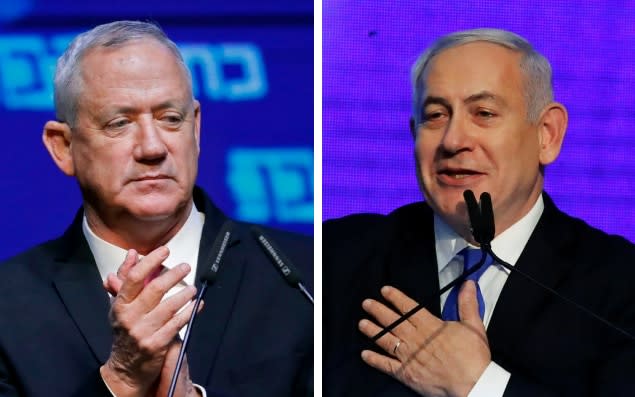Israel election: Netanyahu and rival Gantz appear headed for a tie and intense negotiations

Benjamin Netanyahu’s political survival looked to be in the hands of his renegade former defence minister yesterday after he and his Right-wing allies failed to gain an overall majority.
Israel’s second election in six months delivered another indecisive result, with Mr Netanyahu’s Likud party winning 31 seats compared to the 32 seats won by Blue & White, the centrist coalition led by former general Benny Gantz.
Both sides fell short of the 61 seats needed for a majority. Mr Netanyahu and his Right-wing won 55 seats. Blue & White and the Left-wing parties, along with the party representing Israel’s Arab minority, won 56.
The result is likely to mean weeks of intense post-election negotiations as Mr Netanyahu and Mr Gantz compete to be given the chance to form a government and then to try to cobble together a majority.
They will be jostling for the support of Avigdor Lieberman, Mr Netanyahu’s former defence minister, who is positioned to be a kingmaker.
His secular nationalist Yisrael Beiteinu party won nine seats and holds the balance of power between the two blocs in the divided parliament.
Mr Lieberman is demanding “a broad unity government” made up of Blue & White, Likud and his own Yisrael Beiteinu party.

Mr Gantz says he is seeking the same thing but Mr Lieberman is so far being coy about who he will support.
In a statement, Mr Lieberman said that the two main leaders must agree to his demands for a unity government if they seek his support.
“If Netanyahu and Gantz won't declare publicly that this is also their goal, they shouldn't bother to call me,” he said.
The 61-year-old has served in Mr Netanyahu’s government several times in the past but the two men fell out dramatically in 2018 after Mr Lieberman, then at the defence ministry, resigned and accused the prime minister of being weak against Hamas.
In the coming days Israel’s president, Reuven Rivlin, will survey party leaders to see whether there is more support for Mr Gantz or Mr Netanyahu. The man with the most backing is likely to be given first chance to form a government.
Mr Netanyahu cancelled his plans to travel to New York next week for the UN General Assembly so he could deal with the crisis facing his premiership at home.
The prime minister attempted an initial show of strength by announcing that all 55 Right-wing MPs would join together in a single faction under his leadership for the purpose of coalition negotiations.
“We decided unanimously that we are going together to negotiate in order to form a government that I will lead,” Mr Netanyahu said.

The parliamentary math appears to show that a unity government is the only way forward but a key unresolved question is what role Mr Netanyahu would play in such a government.
Mr Gantz has said he wants a unity coalition but that Mr Netanyahu, who is facing criminal corruption charges, must first resign and be replaced by a new Likud leader.
“The polarisation and antagonism are behind us and unity and reconciliation lie before us,” Mr Gantz said. Senior Likud figures insisted on Wednesday they would not abandon Mr Netanyahu, who has led the party for 20 years.
"We will never accept people dictating who our leaders are,” Nir Barkat, a Likud MP, told The Telegraph. “Netanyahu was elected leader of the Likud and it's in our DNA to support that leader, especially in hard times.”
Mr Netanyahu hinted at possible fears of an internal party coup in a brief election night speech, delivered with a painfully hoarse voice after weeks of campaigning. He thanked his ministers and urged them to “stand united, together in the tasks ahead”.
If Blue & White and Likud are unable to reach a deal on a unity government, and neither side can form a majority on their own, it is possible that Israel will crash into its third election in a year.

The election followed a similar script to the one that preceded it in April, focusing less on policy differences and more on the central question of whether or not Mr Netanyahu should stay in office after 13 years in power.
The prime minister presented himself as an indispensable leader and the only man with the stature and experience on the world stage to guide Israel through the dangerous currents of the Middle East.
“I don’t like Bibi but he’s the best person for the job,” said Shula Feldman, 39-year-old British-Israeli originally from London. “For me, the issue of security overrides everything.”
Like many Likud voters, Mrs Feldman, said she believed the criminal prosecution against Mr Netanyahu was at least partly motivated by politics. “I don’t think there would be charges if he didn’t have so many enemies,” she said.

Mr Netanyahu also repeated campaign tactics that have worked for him in the past including making increasingly extreme pledges to his Right-wing voter base, inciting against Israel’s Arab minority, and issuing panicked warnings that he was going to lose.
Less than a week before the election, Mr Netanyahu pledged to annex the Jordan Valley into Israel, an unprecedented step that would destroy any lingering hopes of a Two-State solution to the Israeli-Palestinian conflict. It was widely seen as an effort to energise his voter base.
Facebook suspended a chatbot belonging to Mr Netanyahu’s Likud party after it sent visitors a message warning of “Arabs who want to destroy us all – women, children and men”.
For his part, Mr Gantz offered himself as a unifying figure who would bring Israel together after years of Mr Netanyahu’s divisive rule. He charged the prime minister with seeking to cling to power only to protect himself from the criminal corruption charges swirling around him.
“The time has come when the majority takes care of everybody and not the minority takes care of one person,” Mr Gantz said, alleging that Mr Netanyahu would rely on the votes of extremists to pass an immunity law that would shield him from prosecution.
Mr Gantz, a liberal, staked out a more aggressively secular position than he did in the last election and promised to challenge the power of the ultra-Orthodox Jewish parties which Mr Netanyahu has relied on.
Mr Gantz said his hope was to form “a secular unity government” led by Blue & White but which also included Likud and the secular nationalist Yisrael Beiteinu party.
However, Mr Gantz said that Likud could only join such a unity government if it first ditched Mr Netanyahu as its leader. Senior Likud figures have said so far said they will remain loyal to Mr Netanyahu.
Moshe Mordechai, a 67-year-old driving instructor, said he normally voted Likud but now intended to back Mr Gantz. “It’s time for a change. Gantz impresses me and I have had enough of Bibi,” he said.

 Yahoo News
Yahoo News 